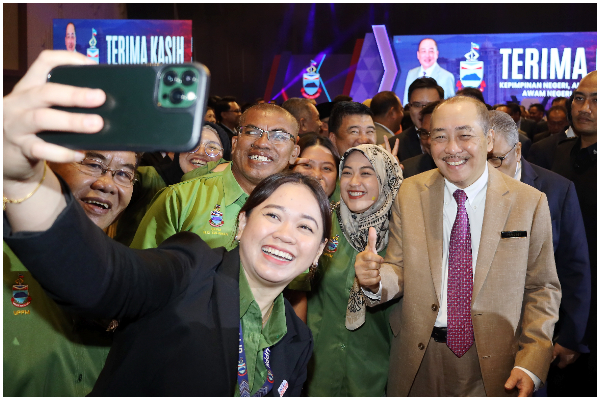Deciding CM: Hajiji did right. Should consider amending Article 7 (1) next
Published on: Tuesday, February 27, 2024
 From left: Hajiji, Shafie and Fuad.
From left: Hajiji, Shafie and Fuad.
Kota Kinabalu: The GRS Government should consider an amendment to Article 7(1) of the Sabah Constitution to further promote political stability in the State, following its repeal last year of Article 6(17).
Tengku Datuk Ahmad Fuad, the State Government’s legal Adviser, said such an amendment would make it clear that the only way to remove a sitting Chief Minister is through a vote of no-confidence in the state legislative Assembly.
ADVERTISEMENT
“It is not for the Yang di-Pertua Negeri (TYT) to decide if the Chief Minister has lost the confidence of the Assembly.
“This will not only promote political stability but also put an end to the use of statutory declarations and other external and extraneous devices that have been used of late in either toppling a government or triggering a state election,” he said in a statement, Monday.
Fuad said this after Parti Warisan President Datuk Seri Mohd Shafie Apdal reportedly said Articles 6(3) and 6(7) of the Sabah Constitution would be reinstated should Warisan come into power.
“Shafie’s pledge to reinstate Articles 6(3) and 6(7) of the Sabah Constitution is both factually and legally wrong,” said Fuad.
ADVERTISEMENT
He said Article 6(3) of the State Constitution has never been repealed by Gabungan Rakyat Sabah (GRS) or any other state government.
“Regarding Article 6(7) of the Sabah Constitution, the GRS-led State Government acted prudently, lawfully and decisively in repealing it on May 25, 2023.
ADVERTISEMENT
“This is because Article 6(7), which was enacted in the 1990s under the then Parti Bersatu Sabah government, was so imprecise and poorly drafted that it led to confusion as to who, how and when the Yang di-Pertua Negeri (TYT) should appoint a Chief Minister.
“It formed the basis of Warisan-Umno’s misguided attempt to take over the Sabah Government in January 2023, the so-called Langkah Kinabalu move,” he said in a statement.
Tengku Fuad said in the years leading up to its repeal, Article 6(7)’s imprecision and lack of clarity constituted substantially the root cause of political instability and constitutional uncertainty in Sabah.
“The fundamental defect of Article 6(7) is that it was inconsistent with a fundamental principle of parliamentary democracy.
“That is individual assemblymen were free to choose who they supported as Chief Minister, regardless of which political party they belonged to.
“By specifying the ‘leader of the political party’’ with a ‘majority of elected seats’, Article 6(7) assumed that those assemblymen would simply support their party leader as Chief Minister.
“Additionally, the TYT’s hands were tied because the party leader with a majority of seats was automatically deemed to command the Assembly’s confidence. Therefore, the TYT could not hear or consider the views of assemblymen as a result of Article 6(7),” he explained.
But what if the assemblymen decide that they do not wish to support their party leader for the post of Chief Minister following an election?
Examples of such similar conduct are found in the Federal Parliament today where several members of Bersatu have pledged their parliamentary support and confidence in Datuk Seri Anwar Ibrahim without resigning from their party.
“Article 6(7) did not acknowledge or recognise such an occurrence and effectively ignored the views of individual assemblymen in respect of which member should be appointed Chief Minister.
“Article 6(7) also presumed that an independent assemblyman was incapable of commanding the confidence of the Assembly and emphasised political parties over individual assemblymen in deciding who would be appointed Chief Minister,” Tengku Fuad added.
He said parliamentary democracy requires that each assemblyman is answerable to his or her electorate and not their respective political parties.
This duty to the electorate extends to the assemblyman’s choice of which member to support as Chief Minister.
“Article 6(7) undermined this principle. This is because the leader of a political party is chosen by party members who are not necessarily assemblymen.
“By effectively placing the choice of Chief Minister in the hands of a political party with the ‘majority of seats’, political party members and not assemblymen are, in effect, the ones who determine who will become Chief Minister. This is contrary to parliamentary democracy.
“Further, it is unclear when Article 6(7) is to be applied. As the law stood prior to 2023, Article 6(7) only applied after a state election and then, only if a political party (or registered coalition) won more than 51 per cent of the seats,” he added.
Uncertainty arose, however, when Warisan-Umno attempted to use Article 6(7) as a tool to remove Hajiji Noor as Chief Minister following the latter resigning from Bersatu and becoming a direct member of GRS.
Warisan-Umno’s argument was that because Warisan had ‘’the most’’ seats in the Assembly, therefore its leader (Shafie and then later Bung) ought to be Chief Minister.
Fuad said the error in Warisan-Umno’s line of reasoning was clear.
“Article 6(7) required a political party to have a majority of 51pc or more and because neither Warisan nor Umno had the numbers, the Langkah Kinabalu move ultimately failed.
“The point to be made here is that Article 6(7)’s imprecision and uncertainty was the cause of such mischief.
“There are more examples of Article 6(7)’s failings, but those mentioned here are sufficient to demonstrate why for the sake of political stability and constitutional certainty, it was both prudent and necessary to repeal Article 6(7),” he said.
Stay up-to-date by following Daily Express’s Telegram channel.
Daily Express Malaysia










